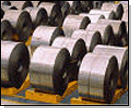
Budget 2005-06: Steel
Being a core sector, steel industry tracks the overall economic growth in the long-term. Also, steel demand, being derived from other sectors like automobiles, consumer durables and infrastructure, its fortune is dependent on the growth of these user industries. India has a per capita consumption of steel of around 30 kgs as against 180 kgs in China and an average of over 400 kgs in the developed countries. This wide gap in relative steel consumption indicates that the potential ahead for India to raise its steel consumption is high.
|
|
Duty on coking coal with high ash content reduced from 15 per cent to 5 per cent. |
|
|
Duty on primary and secondary metals reduced from 15 per cent to 10 per cent. |
|
|
Customs duty on industry raw materials such as catalysts and refractory raw materials reduced from 15 per cent to 10 per cent. |
|
|
Excise duty on steel raised to 16 per cent. |
|
|
Customs duty on ferro-alloys and stainless steel and other alloy steel reduced from 15 per cent to 10 per cent. |
|
|
The reduction in import duties of coking coal with high ash content and also on industry raw materials is a positive for steel players, as this would reduce their raw material costs thus aiding profitability. |
|
|
The hike in excise duty to 16 per cent will not be having any major impact, as the entire duty is modvatable by most category of consumers. |
|
|
The reduction in customs duties on certain steel products by 5 per cent to 10 per cent will exert pressure on steel companies' intentions of raising prices. |
|
|
Going forward, while the demand scenario looks encouraging with China's efforts having failed (as yet) to reign in its economic growth and increased consumption in regions like US, EU and Russia, it is concerns on the supply front that could take a toll on steel prices. With most steel majors across the globe having already announced their capacity expansion plans, the increased supply in the medium-term could pose a serious threat to the sustainability of steel prices at the current levels. Further, China continues to remain one of the key determinants of how the performance of the sector would pan out over the next couple of years, as any shortfall in demand/imports from the country would lead to increased availability of steel for the international markets. This belief is further strengthened by the fact that as per reports, China was a net steel exporter in the closing months of 2004 as it increasingly meets its metal demand internally. Thus, over the medium-term, we would advise caution to investors considering the risk profile of the sector at the current juncture. |
|
|
Reduction in customs duty on coking coal with ash content of 12 per cent or more to 10 per cent from 15 per cent
|
|
|
|
Reduce import duties on graphite electrodes (above 24" in size) from 15 per cent to 10 per cent (CII)
|
|
|
|
Reduce excise duty on steel (raised during the previous budget) from the current 12 per cent (FICCI)
|
|
|
|
Rationalisation of duties on items such as ferro-alloys and zinc where duties are currently at 15 per cent (SAIL)
|
|
|
|
Reduce import duties on cold rolled/hot rolled steel, alloy steel and die steel for used by the auto industry from the current levels (FICCI) |
| Budget 2002-03 |
|
Budget 2003-04 |
|
Budget 2004-05 |
|
|
|
|
|
|
Custom duty on seconds and defective (on hot rolled coils) increased to 40 per cent from the earlier 35 per cent.
Custom duty on ship breaking scrap increased to 15 per cent from the current 5 per cent. CVD (counter veiling duty of 16 per cent) and SAD (special additional duty) are exempted.
Custom duty on graphite electrode of size above 24'" reduced to 15 per cent from the earlier 25 per cent. Custom duty on refractory raw material (micro silica/fume silica) reduced to 25 per cent from the earlier 35 per cent. |
|
Finance minister reaffirmed the thrust on infrastructure development by announcing new infrastructure projects.
Peak customs duty reduced from 30 per cent to 25 per cent.
Decrease in freight rate by 5.3 per cent. Confessional freight for short distance transportation.
Tax sops maintained for the housing sector.
Surcharge on corporate tax halved from the current 5 per cent to 2.5 per cent |
|
Excise duty raised on iron and steel from 8 per cent to 12 per cent.
Customs duty reduced from 15 per cent to 10 per cent on all primary, semi-finished and finished forms of iron and steel like ingots and billets, sponge iron, hot rolled and cold rolled bars/rods/coils of non-alloy steel (other than seconds and defectives).
Customs duty reduced from 20 per cent to 15 per cent on ferro alloys, stainless steel and other alloy steel, excluding seconds and defectives.
A surcharge of 2 per cent on account of education cess will be imposed on corporate tax. | |

Equitymaster.com is one of India's premier finance portals. The web site offers a user-friendly portfolio tracker, a weekly buy/sell recommendation service and research reports on India's top companies.









 © 2025
© 2025